

Lut’s (عليه السلام) People. بسم الله الرحمن الرحيم الحمد لله رب العالمين و الصلاة و السلام علي رسوله الكريم Allah Tala mentions in the Quran: و من آياته أن خلق لكم من أنفسكم أزواجا لتسكنوا إليها و جعل بينكم مودة و رحمة إن في ذلك لأيت لقوم يتفكرون “Among His signs is that He created spouses for you from yourselves so that you would find peace with them; and He put love and mercy between you.
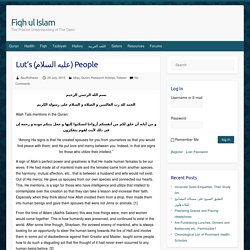
Tafsir Ibn Kathir. الموسوعة الشاملة - العظمة - أبو الشيخ. تنوير المقباس من تفسير ابن عباس. التفاسير. Search results. Reading Tafsir. Tafsir - Arabic. Types of Christianity in History: Who Were the First Christians? On this page: 1.

Christianity Was Always Massively Varied 'Christianity' is not a single religion dating from 2,000 years age. A long series of varied different religions, flowing on from one another, have all called themselves "Christian". Rightly so. Al-Ma'mun. Abū Jaʿfar Abdullāh al-Maʾmūn ibn Harūn (also spelled Almamon, Al-Maymun, Al-Ma’moon,[2] Mahmoun[3] and el-Mâmoûn (Arabic: ابوجعفر عبدالله المأمون) ( September 786 – 9 August 833) was an Abbasid caliph who reigned from 813 until his death in 833.
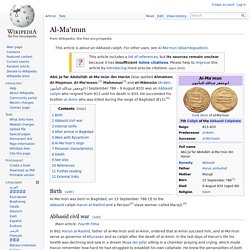
He succeeded his brother al-Amin who was killed during the siege of Baghdad (813).[4] Birth[edit] Al-Maʾmūn was born in Baghdad, on 15 September 786 CE to the Abbasid caliph Harun al-Rashid and a Persian[5] slave woman called Marajil.[6] Abbasid civil war[edit] Main article: Fourth Fitna. Muhammad abdo. Unicitylight & al-Futuhat - Histoire de l'Islam et des Musulmans.
Prophets fr. Lespreuvesdel interdictiondelamixit. ~ Les Femmes Pieuses : Aicha ~ Le hadith des 73 sectes expliqué par les grands Savants Sunnites. Histoire de l'Islam et des Musulmans.
La médecine Prophétique Jalâl Ad-Dîn As-Souyoûtî [Pdf; word] - Bibliothèque : Livres Islamiques – Koutub Islamiya. Extrait de la médecine prophétique par l'imam Ibn Al-Qayyim [Pdf, word] - Bibliothèque : Livres Islamiques – Koutub Islamiya. L'authentique de la médecine Prophètique Par l’imam Ibn Al-Qayyim. Qui sont les douze califes du Prophète? The Prophet’s (s) Seating on the Throne. (Iq‘âd al-Nabî (s) ‘alâ al-‘Arsh) Dr.
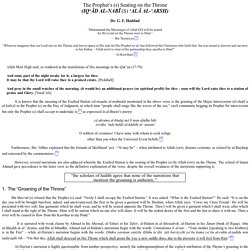
G. F. Haddad. Writing and Literature: Islamic Period, Michael Sells. 3 of 6 From the second through the fourth century of Islam, the literary arts blossomed.
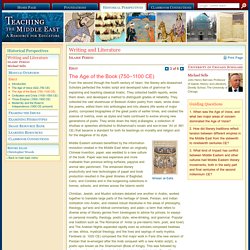
Scholars perfected the Arabic script and developed rules of grammar for explaining and teaching classical Arabic. They collected hadith reports, wrote them down, and developed a method to distinguish grades of reliability. L’Islam : débuts, expansion, sociétés et cultures. Musaylimah. Musaylimah (Arabic: مسيلمة) or Musaylimah bin Ḥabīb (Arabic: مسيلمة بن حبيب) was one of a series of people (including his future wife) who claimed prophethood in 6th century Arabia, which included the Islamic prophet Muhammad.
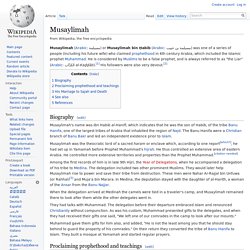
He is considered by Muslims to be a false prophet, and is always referred to as "the Liar" (Arabic: الكذّاب al-Kaḏḏāb).[1] His followers were also very devout.[2] Biography[edit] Musaylimah's name was Ibn Habib al-Hanifi, which indicates that he was the son of Habib, of the tribe Banu Hanifa, one of the largest tribes of Arabia that inhabited the region of Najd. The Banu Hanifa were a Christian branch of Banu Bakr and led an independent existence prior to Islam.
Ridda wars. Map detailing arenas of Ridda campaigns.
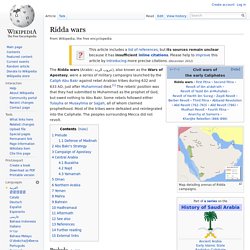
The Ridda wars (Arabic: حروب الردة), also known as the Wars of Apostasy, were a series of military campaigns launched by the Caliph Abu Bakr against rebel Arabian tribes during 632 and 633 AD, just after Muhammad died.[1] The rebels' position was that they had submitted to Muhammad as the prophet of God, but owed nothing to Abu Bakr. Some rebels followed either Tulayha or Musaylima or Sajjah, all of whom claimed prophethood. List of non-Arab Sahabah. The list of non-Arab Sahaba includes non-Arabs among the original Sahaba of the Islamic prophet Muhammad.
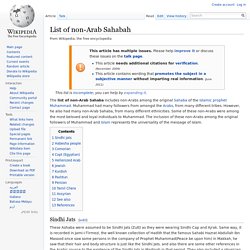
Muhammad had many followers from amongst the Arabs, from many different tribes. However, he also had many non-Arab Sahaba, from many different ethnicities. Some of these non-Arabs were among the most beloved and loyal individuals to Muhammad. History of Islam. The history of Islam concerns the religion of Islam and its adherents, Muslims.
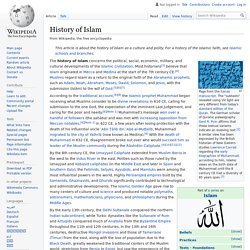
"Muslim" is an Arabic word meaning "one who submits to God". Muslims and their religion have greatly impacted the political, economic, and military history of the Old World, especially the Middle East, where its roots lie. Though it is held by non-Muslims to have originated in Mecca and Medina, Muslims believe that the religion of Islam has been present since the time of the prophet Adam. Muslims believe that prophets Noah, Abraham, Moses, Jesus, among others, were all Islamic prophets, and they have equal veneration in the Qur'an.
The Islamic world expanded to include people of the Islamic civilization, inclusive of non-Muslims living in that civilization. Timeline of 7th-century Muslim history. Seventh century (601 - 700)[edit] This century corresponds to approximately 23 BH - 81 AH.
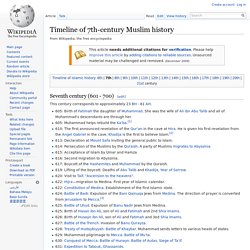
See also[edit] Timeline of Muslim history References[edit] Major Events in the Life of Prophet Muhammad. Islam de France - La bataille de Yarmouk. La Bataille de Badr : 313 VS 1000. Bataille du Yarmouk. Greater Khorasan. Names of territories during the Caliphate in 750 CE. Khorasan, also written as Khurasan (Middle Persian: Khwarāsān, Persian: خراسان بزرگ, or خراسان کهن listen ), is a historical region[1] lying in the northeast of Persia. "In pre-Islamic and early Islamic times, the term "Khurassan" frequently had a much wider denotation, covering also parts of Central Asia and Afghanistan; early Islamic usage often regarded everywhere east of western Persia, sc. Djibal or what was subsequently termed 'Irak 'Adjami, as being included in a vast and ill-defined region of Khurasan, which might even extend to the Indus Valley and Sind. La Naissance du Prophète MouHammad Mawlid Nabawi. Muhammad's Silly and Ridiculous Teachings [Part 2]
Sam Shamoun We continue with our analysis of the Hadith literature. Muhammad erroneously believed that inanimate objects could actually speak and feel, and do other things like humans do: “Narrated Abdullah bin Umar: Allah’s messenger said, ‘You (i.e. Muslims) will fight against the Jews till some of them will hide behind stones.